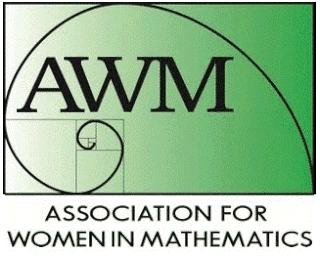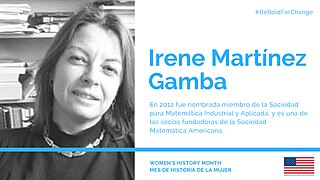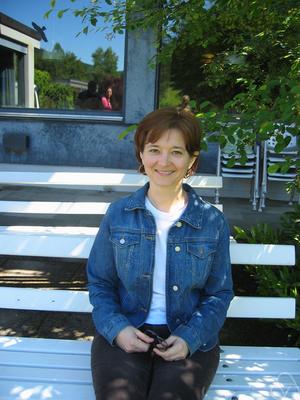Related Research Articles

Éva Tardos is a Hungarian mathematician and the Jacob Gould Schurman Professor of Computer Science at Cornell University.

The Association for Women in Mathematics (AWM) is a professional society whose mission is to encourage women and girls to study and to have active careers in the mathematical sciences, and to promote equal opportunity for and the equal treatment of women and girls in the mathematical sciences. The AWM was founded in 1971 and incorporated in the state of Massachusetts. AWM has approximately 5200 members, including over 250 institutional members, such as colleges, universities, institutes, and mathematical societies. It offers numerous programs and workshops to mentor women and girls in the mathematical sciences. Much of AWM's work is supported through federal grants.

Linda Jo Goldway Keen is an American mathematician and a fellow of the American Mathematical Society. Since 1965, she has been a professor in the Department of Mathematics and Computer Science at Lehman College of the City University of New York and a Professor of Mathematics at Graduate Center of the City University of New York.
Chi-Wang Shu is the Theodore B. Stowell University Professor of Applied Mathematics at Brown University. He is known for his research in the fields of computational fluid dynamics, numerical solutions of conservation laws and Hamilton–Jacobi type equations. Shu has been listed as an ISI Highly Cited Author in Mathematics by the ISI Web of Knowledge.

Kristin Estella Lauter is an American mathematician and cryptographer whose research interest is broadly in application of number theory and algebraic geometry in cryptography. She is particularly known for her work in the area of elliptic curve cryptography. She was a researcher at Microsoft Research in Redmond, Washington, from 1999–2021 and the head of the Cryptography Group from 2008–2021; her group developed Microsoft SEAL. In April 2021, Lauter joined Facebook AI Research (FAIR) as the West Coast Head of Research Science. She became the President-Elect of the Association for Women in Mathematics in February 2014 and served as President February 1, 2015 - January 31, 2017.
Michael J. Shelley is an American applied mathematician who works on the modeling and simulation of complex systems arising in physics and biology. This has included free-boundary problems in fluids and materials science, singularity formation in partial differential equations, modeling visual perception in the primary visual cortex, dynamics of complex and active fluids, cellular biophysics, and fluid-structure interaction problems such as the flapping of flags, stream-lining in nature, and flapping flight. He is also the co-founder and co-director of the Courant Institute's Applied Mathematics Lab.

Barbara Lee Keyfitz is a Canadian-American mathematician, the Dr. Charles Saltzer Professor of Mathematics at Ohio State University. In her research, she studies nonlinear partial differential equations and associated conservation laws.
Joyce Rogers McLaughlin was an American mathematician, the Ford Foundation Professor of Mathematics at Rensselaer Polytechnic Institute. Her research interests were primarily in applied mathematics, and in particular in inverse problems.
Susanne Cecelia Brenner is an American mathematician, whose research concerns the finite element method and related techniques for the numerical solution of differential equations. She is a Boyd Professor at Louisiana State University. Previously, she held the Nicholson Professorship of Mathematics and the Michael F. and Roberta Nesbit McDonald Professorship at Louisiana State University, She currently chairs the editorial committee of the journal Mathematics of Computation. During 2021-2022 she is serving as President of the Society for Industrial and Applied Mathematics (SIAM).
Catherine Sulem is a mathematician and violinist at the University of Toronto.

Irene Martínez Gamba is an Argentine–American mathematician. She works as a professor of mathematics at the University of Texas at Austin, where she holds the W.A. Tex Moncrief, Jr. Chair in Computational Engineering and Sciences and is head of the Applied Mathematics Group in the Oden Institute for Computational Engineering and Sciences.

Bonnie Anne Berger is an American mathematician and computer scientist, who works as the Simons professor of mathematics and professor of electrical engineering and computer science at the Massachusetts Institute of Technology. She is the head of the Computation and Biology group at MIT's Computer Science and Artificial Intelligence Laboratory. Her research interests are in algorithms, bioinformatics and computational molecular biology.

Jill P. Mesirov is an American mathematician, computer scientist, and computational biologist who is the Associate Vice Chancellor for Computational Health Sciences at the University of California, San Diego. She previously held an adjunct faculty position at Boston University and was the associate director and chief informatics officer at the Eli and Edythe L. Broad Institute of MIT and Harvard.

Lai-Sang Lily Young is a Hong Kong-born American mathematician who holds the Henry & Lucy Moses Professorship of Science and is a professor of mathematics and neural science at the Courant Institute of Mathematical Sciences of New York University. Her research interests include dynamical systems, ergodic theory, chaos theory, probability theory, statistical mechanics, and neuroscience. She is particularly known for introducing the method of Markov returns in 1998, which she used to prove exponential correlation delay in Sinai billiards and other hyperbolic dynamical systems.
Suzanne Marie Lenhart is an American mathematician who works in partial differential equations, optimal control and mathematical biology. She is a Chancellor's Professor of mathematics at the University of Tennessee, an associate director for education and outreach at the National Institute for Mathematical and Biological Synthesis, and a part-time researcher at the Oak Ridge National Laboratory.
Carol San Soucie Woodward is an American computational mathematician who works in the Center for Applied Scientific Computing at Lawrence Livermore National Laboratory. She was elected as a fellow of the Society for Industrial and Applied Mathematics (SIAM) in 2017, "for the development and application of numerical algorithms and software for large-scale simulations of complex physical phenomena".

Liliana Borcea is the Peter Field Collegiate Professor of Mathematics at the University of Michigan. Her research interests are in scientific computing and applied mathematics, including the scattering and transport of electromagnetic waves.
Anne Greenbaum is an American applied mathematician and professor at the University of Washington. She was named a SIAM Fellow in 2015 "for contributions to theoretical and numerical linear algebra". She has written graduate and undergraduate textbooks on numerical methods.
Beatrice Marie Riviere is a computational and applied mathematician. She is the Noah Harding Chair and Professor in the department of computational and applied mathematics at Rice University. Her research involves developing efficient numerical methods for modeling fluids flowing through porous media.
The AWM-SIAM Sonia Kovalevsky Lecture is an award and lecture series that "highlights significant contributions of women to applied or computational mathematics." The Association for Women in Mathematics (AWM) and the Society for Industrial and Applied Mathematics (SIAM) planned the award and lecture series in 2002 and first awarded it in 2003. The lecture is normally given each year at the SIAM Annual Meeting. Award winners receive a signed certificate from the AWM and SIAM presidents.
References
- ↑ "Speaker biography: Lisa Fauci", 8th International Congress on Industrial and Applied Mathematics, Beijing, China, August 2015, retrieved 2015-09-09.
- ↑ Faculty by Research Interests, Tulane University Mathematics Department, retrieved 2015-09-09.
- ↑ "Leadership". SIAM . Retrieved 2019-12-11.
- 1 2 "News from the National Academy of Sciences". National Academy of Sciences. Retrieved 2023-05-11.
- 1 2 Lisa Fauci bio , retrieved 2015-09-09.
- ↑ "Q&A with the ANZIAM 2014 Female Plenary Speakers", ANZIAM 2014, Rotorua, New Zealand, Australian and New Zealand Industrial and Applied Mathematics, retrieved 2015-09-09.
- 1 2 3 Curriculum vitae: Lisa J. Fauci , retrieved 2015-09-09.
- ↑ Lisa Fauci at the Mathematics Genealogy Project.
- ↑ SIAM Fellows: Class of 2012 , retrieved 2015-09-09.
- ↑ "AMS Committees". American Mathematical Society. Retrieved 2023-03-27.
- ↑ Lisa Fauci to be AWM-SIAM Sonia Kovalevsky Lecturer, Association for Women in Mathematics, March 28, 2015, retrieved 2016-05-01.
- ↑ "APS Fellowship". www.aps.org. Retrieved 2020-06-07.
- ↑ "AAAS Announces Leading Scientists Elected as 2019 Fellows". American Association for the Advancement of Science. Retrieved 2023-04-13.
- ↑ "2020 Class of the Fellows of the AMS". American Mathematical Society . Retrieved 2019-11-03.
- ↑ "The AWM Fellows Program: 2023 Class of AWM Fellows". Association for Women in Mathematics. Retrieved 2022-10-23.
- ↑ "Dr. Lisa Fauci: Hall of Fame Award Winner | Tulanian". tulanian.tulane.edu. Retrieved 2024-04-04.
- ↑ "Lisa Fauci". Biomedical Mathematics Group. Retrieved 2024-07-27.